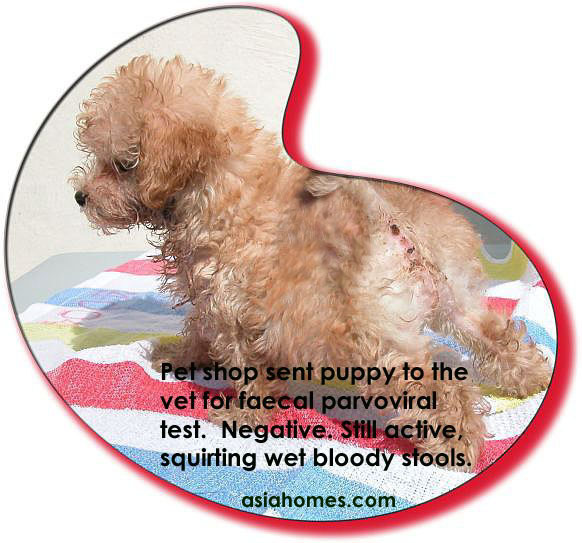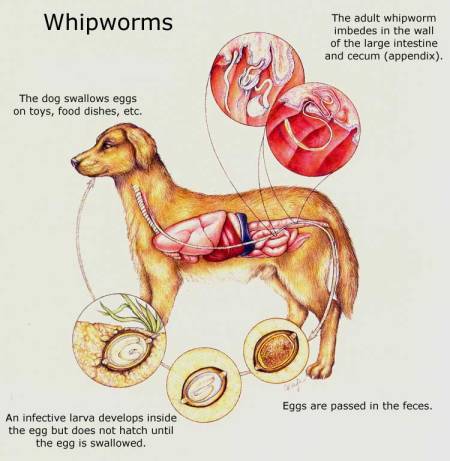"I had the
puppy sent to a vet to test for parvovirus," the pet shop girl said
to me when I did a house call to vaccinate some puppies. "It was
negative for parvoviral infection. The vet could not find
anything wrong with this poodle."
She continued: "I had complained of this puppy having diarrhoea on
the day of sale?" Vets are supposed to remember every animal
being treated and their condition. I nodded my head. I was consulted
when she was selling the puppy and I had asked: "Did you deworm the
puppy?" She said yes.
Diarrhoea is a common occurrence in puppies in pet shops and to save
on veterinary expenses for the pet shop owner, I did not do a stool
check as this puppy was otherwise healthy. It seemed to me
that a new pet shop is set up every week and many do close down and
it is essential that the pet shop operator contained their
operational cost.
Singaporeans were not spending much on pets in this June month
although there was a mention of economic recovery. Families
might have gone abroad for holidays as the low-cost airline carriers
made travel so much more affordable.
The 10-week-old toy poodle puppy was eating and active. It barked
from inside its cage to attract attention. Yet, there was
something wrong. No normal puppy would squirt a watery and
smelly reddish stool from its backside every few hours. The blood
became more smelly every day.

This was a challenging case. How should I handle this case? The
buyer had returned the puppy to the pet shop girl. If it died,
she would have to refund the monies. It was a matter of time before
it would die from dehydration and bacterial infection of the
intestines. There was no vomiting and that was a good sign.
Would the puppy be sensitive to the dog food? Generous amount
of pieces of chicken from the chicken rice stall were offered in a
separate dish to the puppy. Was it allergic to chicken meat?
Was it suffering from the
lymphocytic-plasmacytic Inflammatory Bowel Disease whereby the
puppy's white blood cells called lymphocytes and plasma cells invade
the intestines? Or suffering from an Irritable Bowel Syndrome?
This condition occurs in hyper-excitable, stressed or overworked
dogs and the cause is said to be pyschological. The puppy was
too young to consider that it was suffering from the lymphosarcoma
and adenosarcoma cancers of the intestines. It was
confined indoors and would not be having a foreign body colitis
as it had no access to objects like sand or grass.
The pet shop girl dewormed the puppy. The vet who tested it for
parvovirus could not find anything wrong with it. What should I do
now?
In such cases, I had to take the puppy back to the surgery for close
observation. It was still very playful. It still ate.
The characteristic smell of blood in its stools with blood announced
its passage every now and then. The stools were quickly removed. I
put some stools under the microscope to look for worm eggs.
Nothing was seen for the first two samples. A third sample of
its diarrhoea showed one thick-shelled spherical worm egg.
Hookworm eggs are oval shaped but I could be viewing it from the end
view. Just one egg.

|
The picture above,used in this education article is taken from Hill's Atlas of
Clinical Anatomy, published by Veterinary Medicine Publishing
Company, Inc. A publication donated to veterinarians by the
Hill's Pet Food Company to teach clients about their dogs and
cats in sickness and in health. Hill's Pet Food Company
produces Hill's Prescription Diets and Science Diet Premium
Pet Food. |
Worms that attached
themselves to the puppy's intestines to suck blood would have caused
inflammation and bleeding, causing colitis. The stools would then
have spots of blood. Fresh red blood if the bleeding
originated from the large intestines and caecum (which is called
"appendix" in human). Dark red blood if they imbed in the
small intestines using their mouth parts to hook onto intestinal
tissues.
The puppy was given the deworming medicine, antibiotics, rehydration
salts and the dry dog food sold by the pet shop. It took four days
to recover. Would the diarrhoea come back again
when it went home? It could swallow the worm eggs present in
its paws, cage and feed dishes and the problem would recur in 1-3
months when the eggs hatch. The worms would then attach themselves
to the intestines to suck blood.
Such eggs are microscopic and could not be seen. Fortunately
it did not eat its own stools.

As there were no further complaints from the pet shop or the owner
for the next two weeks, it must have passed normal stools.
In this case, to enhance veterinary communication with an owner I had not seen
in this age of litigation and official complaints,
I enclosed a sample of its normal stools in a bag to be given to the
owner to confirm that the puppy now had recovered. A body of
evidence, just like worn out car brake discks given by the car servicing
workshop after replacement of new brakes and put inside the car to
convince owners that they had new brake discs.
Such worn out car brake discs could be from any other car. How was
the ordinary car owner to differentiate them as he was not present
to seethat new manufacturer-genuine brake discs had been replaced?
But the colour and form of the stool evidence from this puppy could
be reproduced or duplicated exactly by the next defaecation and
therefore a solid body of evidence that the vet had serviced the
canine alimentary (digestive) system.
The owner was
instructed to feed just the particular brand of dog food and water
for the next 14 days. Certainly no more oily chicken pieces
from chicken rice, a most popular dish with Singaporeans to upset
the intestinal mucosal cells for the next fortnight.
 ASIAHOMES.COM'S
TIPS FOR A LONGER LIFE FOR YOUR PETS
is a Community Education project
using narrative stories. It is sponsored by
Asia USA Realty (Singapore)
asiahomes.com Pte Ltd ASIAHOMES.COM'S
TIPS FOR A LONGER LIFE FOR YOUR PETS
is a Community Education project
using narrative stories. It is sponsored by
Asia USA Realty (Singapore)
asiahomes.com Pte Ltd
The article"The puppy
was active but it squirted bloody stools is extracted from the book "How Your
Puppy Can Live Longer".
This article is published in Sin Pet
magazine July 2004. Pictures and the article are
©Asia
USA
Realty (Singapore) asiahomes.com Pte Ltd.
Website: asiahomes.com. Focus:
We find affordable homes for expats. Update:
06 Jun 2004
|